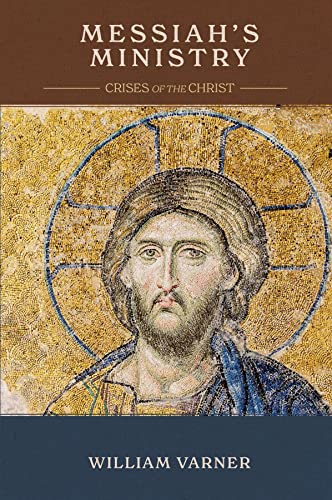An Author Interview from Books At a Glance
Would you like to watch the video interview or listen to the audio? Sign-up today for access to these features and more.
Greetings, I’m Fred Zaspel, and welcome to another Author Interview here at Books At a Glance. Today we’re talking to Dr. Will Varner about his new book, Messiah’s Ministry: Crises of the Christ, the third in a trilogy about Jesus the Messiah.
Will, great to have you back, and congratulations on this new book!
Varner:
Thank you, Fred. It is always good to be here.
Zaspel:
This is the third of three books on the Messiah. Tell us about the three and then about this one in particular.
Varner:
I would be happy to. I wrote these in an odd order, not in the chronological order of our Lord’s life. I wrote them 3, 1, 2. The first was about passion week. Then I wrote Anticipating the Advent. And then my Bible department here at The Master’s University said, “you have written on the end and beginning of the Lord’s life why don’t you write something on the middle?” This is his baptism through his transfiguration, that center part of Jesus’ ministry. Older folks will remember G. Campbell Moore. He had a book, Crises of the Christ, and I used that as the subtitle of this book.
Zaspel:
Some years ago you published another book about the Messiah. That makes this new book your fourth book about the Messiah. Is that earlier book still in print? And why isn’t that part of this series?
Varner:
You have done your homework. I appreciate it. Back in 1994, I published The Messiah: Revealed, Rejected, and Received, and I self-published it with AuthorHouse. It has had a good run but this one is not just about the Messiah but the Lord Jesus and the Messianic background of his life and ministry. I did borrow a few chapters from this book, reworked them, and updated them. I then added a whole bunch of new chapters. There is a connection and I mention that in the book.
Zaspel:
Before we go any further let’s make sure everyone understands your title: What is “Messiah,” and what does that have to do with Jesus?
Varner:
My introductory chapter is, “What Is a Messiah?” I start off with a silly story about the few days after the birth of Jesus. It is a made-up story. Mary and Joseph have Jesus at the city hall of Bethlehem. This grouchy old guy says, “what’s the kid’s name?” Mary says, “Jesus Christ.” He then asks, “What’s your name?” She says, “I am Mary Christ, and this is Joseph Christ.” That silly story builds off the fact that Jesus Christ is not his given and family name. It is a title and means anointed one.
I begin not assuming that people know what “of Christ” is. He is the anointed one who was prepared for in the Old Testament by prophets, priests, and kings. They began their ministry with an anointing with oil thus they became an anointed one. Together in the New Testament, we read that our Messiah was one who combined all three of those. As you know Fred, you could be a prophet and a king though it was rare. You could be a priest and a prophet, like Zechariah and Ezekiel. But you could not be a priest and king in Israelite theocracy since they came from different tribes. Jesus is that priest-king in addition to his role as prophet. He combines the role of prophet, priest, and king all together in one person.
Zaspel:
This book isn’t just a life of Christ, as such, but your fifteen chapters highlight various events of Jesus’ life and the various ways he is presented in the Gospels. What was your agenda, and how did you determine which topics to include?
Varner:
My agenda was to first set the stage and tell what the men of Qumran believed about the Messiah. They believed in an individual prophet, priest, and king. But they were three different persons. They were in the right direction. I also mention some about Josephus. Then I start with the first chapter with “Messiah in the Water” and the second chapter is the “Messiah in the Wilderness.” That is his baptism and temptation.
Then I did some selective things about how a better understanding of the Old Testament background can inform how Matthew presents the Messiah, and how the Messiah is a new Moses. I mention the inauguration of his ministry there in Nazareth when he was not declared man of the century, but he claimed Isaiah as saying the Spirit of the Lord is upon me, in Luke 4. In other words, I am the anointed one. Of course, that led to various problems.
I mention the Messiah and women. That is often misunderstood. Jesus was not anti-women but liberated them through his Gospel. I jump in them with the Messiah and the Gentiles. I pull something new that I had not noticed before. I always taught that the two feedings of 5,000 and 4,000 were two Jewish congregations. I give reasons why I became convinced the 5,000 who were fed were Jewish and the 4,000 fed were predominately Gentile. Part of my reasoning is that when they were fed, they quote “glorify the God of Israel,” which would be appropriate if they were Gentiles.
I then mention the Messiah and the mad man. This is one of my favorites, it is the story of lunatic, or the demon-possessed man. Towards the end, I conclude with the Messiah’s metamorphosis. How Moses and Elijah were with him on that mount. I bring it to a practical conclusion. I say Messiah Jesus is who the Jews should believe on. I am praying this book will get into the hands of Jewish people as well. They will know there is a reason to believe in Jesus from their Jewish perspective.
Zaspel:
Highlight for us some of the messianic-related themes that you treat in your book.
Varner:
In my last book, there was a great emphasis on the Messiah as the suffering servant. That is very clear during the passion week. I did things like drawing from Genesis 12:3 and from the later part of Isaiah where the Gentiles are included in this. Sometimes there is this silly belief that Jesus came just for the Jews, and they rejected him. Then “plan B” went into effect to save the Gentiles. Saving the Gentiles was not “plan B.” From the beginning Genesis 12:3 and 49:10 talk about how the Messiah is for the nations. He did not seek out the Gentiles but when they came to him, he never turned them away. That prepared the way for the book of Acts and Peter opening the door wide to the Gentiles. That is a theme that is oftentimes neglected.
Zaspel:
You have quite an emphasis on Jewish backgrounds—tell us how that is important for your work.
Varner:
I graduated from The University of South Carolina. I don’t think I ever met a Jewish person but up North, they are all over the place. I fell in love with them. Additionally, I took a master’s degree in Jewish studies at Dropsie University. I ended up after 17 years with the Friends of Israel Gospel Ministry. The Jewish people developed in my heart and mind. They have never been out of it. This is why messianic prophecy is very important.
My last chapter began with a guy who gave me a flyer that was passed out on the University of Arizona’s campus. It was an anti-Christian-missionary flyer. It said, “Jews should not believe in Jesus,” and he gave four or five reasons. I answered that and sent it back to the fellow. I turned it into a chapter and answer the Jewish rejection of Jesus, urging them to believe in him for the following reasons.
That is the orientation for all my writings. Hence Josephus, Qumran, and the chapter on why Jews need to follow Jesus. Sadly, our Jewish friends, usually do not even know why they are not believing except for the fact that Jesus suffered. They believe when their messiah comes, he is going to make them free. He hung on a cross, and they say, “what kind of Messiah is that?” I go into it in my other books and talk about how it was the plan that he would suffer. The Jewish people are never far from my writing.
Zaspel:
We’re talking to Dr. Will Varner about his new book, Messiah’s Ministry: Crises of the Christ. It’s an enlightening read that will deepen your appreciation of Christ in the days of his earthly ministry. Thoroughly enjoyable.
Will, thank you again for your good work, and thanks for talking with us again!
Varner:
Thank you. May the Prophet, Priest, and King receive all glory through our ministries. Thank you, Fred.


